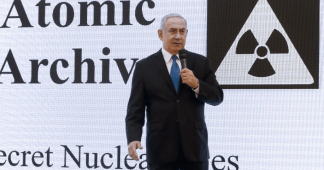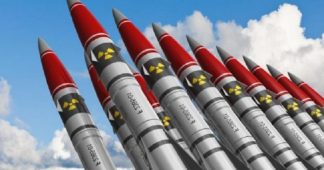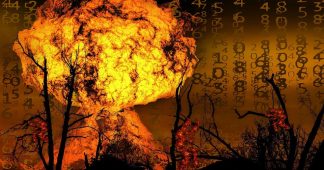“There is an urgent need to restore nuclear diplomacy and strengthen international controls on nuclear arms.”
By Jake Johnson
Jun 12, 2023
A leading international think tank said Monday that the world is “drifting into one of the most dangerous periods in human history” as nuclear-armed countries continue adding to their stockpiles, with the total number of operational weapons of mass destruction growing last year.
The latest research from the Stockholm International Peace Research Institute (SIPRI) estimates that the nine countries currently known to be in possession of nuclear weapons had 9,576 working nukes at the beginning of 2023, up slightly from the 9,490 total in January 2022.
Just two countries—the United States and Russia—control 90% of the world’s nuclear arsenal, respectively possessing 3,708 and 4,489 working nukes, SIPRI found. Both nations have thousands of warheads deployed on military bases with operational forces.
While “the sizes of their respective nuclear arsenals (i.e. useable warheads) seem to have remained relatively stable in 2022,” the think tank noted, “transparency regarding nuclear forces declined in both countries in the wake of Russia’s invasion of Ukraine in February 2022.”
China has the third-largest arsenal of operational nuclear warheads with 410—up from 350 last year—followed by France (290) and the United Kingdom (225).
Nuclear-armed nations also collectively possess thousands of retired warheads that are awaiting dismantlement. The total worldwide inventory of nuclear weapons, including retired and operational arms, was 12,512 at the beginning of this year.
But SIPRI found that “the number of operational nuclear weapons started to rise as countries’ long-term force modernization and expansion plans progressed.”
“Global reductions of operational warheads appear to have stalled,” the think tank observed, “and their numbers are rising again.”
Dan Smith, SIPRI’s director, said the new research underscores the “urgent need to restore nuclear diplomacy and strengthen international controls on nuclear arms.”
“In this period of high geopolitical tension and mistrust, with communication channels between nuclear-armed rivals closed or barely functioning, the risks of miscalculation, misunderstanding, or accident are unacceptably high,” said Smith. “There is an urgent need to restore nuclear diplomacy and strengthen international controls on nuclear arms.”
At the start of 2023, the 9 nuclear-armed states possessed an estimated 12 512 nuclear weapons:
USA?? 5 244
Russia?? 5 889
UK?? 225
France?? 290
China?? 410
India?? 164
Pakistan?? 170
North Korea?? 30
Israel?? 90Read more in #SIPRIYearbook 2023 ➡️ https://t.co/OX8Eubunzu pic.twitter.com/BJzHpdODb7
— SIPRI (@SIPRIorg) June 12, 2023
The new research comes in the wake of several developments that alarmed nonproliferation campaigners, including Russia’s decision to suspend its participation in the New START nuclear treaty with the U.S. amid elevated tensions over Ukraine.
Additionally, the Biden administration released a Nuclear Posture Review that left open the possibility of a nuclear first strike, violating the president’s pledge to ensure that the U.S. nuclear arsenal is only used for deterring and, if necessary, retaliating against a nuclear attack.”
Both the U.S. and Russia have opposed the Treaty on the Prohibition of Nuclear Weapons—which bars signatories from using, threatening to use, developing, or stockpiling nukes—and have been accused of flouting their obligations under the Nuclear Nonproliferation Treaty.
“Most of the nuclear-armed states are hardening their rhetoric about the importance of nuclear weapons, and some are even issuing explicit or implicit threats about potentially using them,” said Matt Korda, associate researcher with SIPRI’s weapons of mass destruction program. “This elevated nuclear competition has dramatically increased the risk that nuclear weapons might be used in anger for the first time since World War II.”
We remind our readers that publication of articles on our site does not mean that we agree with what is written. Our policy is to publish anything which we consider of interest, so as to assist our readers in forming their opinions. Sometimes we even publish articles with which we totally disagree, since we believe it is important for our readers to be informed on as wide a spectrum of views as possible.











